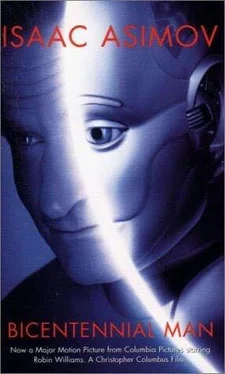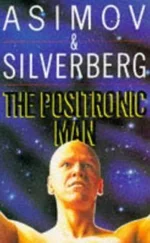“Can be negotiated by nuclear-powered ships that are now on the drawing board. You don’t know that but I do.”
“We’re not even sure about the depth of the atmosphere. The pressures—”
“The pressures! The pressures! Mr. Demerest, look about you. Why do you suppose Ocean-Deep was really built? To exploit the ocean? The settlements on the continental shelf are doing that quite adequately. To gain knowledge of the deep-sea bottom? We could do that by ’scaphe easily and we could then have spared the hundred billion dollars invested in Ocean-Deep so far.
“Don’t you see, Mr. Demerest, that Ocean-Deep must mean something more than that? The purpose of Ocean-Deep is to devise the ultimate vessels and mechanisms that will suffice to explore and colonize Jupiter. Look about you and see the beginnings of a Jovian environment; the closest approach we can come to it on Earth. It is only a faint image of mighty Jupiter, but it’s a beginning.
“Destroy this, Mr. Demerest, and you destroy any hope for Jupiter. On the other hand, let us live and we will, together, penetrate and settle the brightest jewel of the Solar System. And long before we can reach the limits of Jupiter, we will be ready for the stars, for the Earth-type planets circling them, and the Jupiter-type planets, too. Luna City won’t be abandoned because both are necessary for this ultimate aim.”
For the moment, Demerest had altogether forgotten about that last button. He said, “Nobody on Luna City has heard of this.”
“You haven’t. There are those on Luna City who know. If you had told them of your plan of destruction, they would have stopped you. Naturally, we can’t make this common knowledge and only a few people anywhere can know. The public supports only with difficulty the planetary projects now in progress. If the PPC is parsimonious it is because public opinion limits its generosity. What do you suppose public opinion would say if they thought we were aiming toward Jupiter? What a super-boondoggle that would be in their eyes. But we continue and what money we can save and make use of we place in the various facets of Project Big World.”
“Project Big World?”
“Yes,” said Annette. “You know now and I have committed a serious security breach. But it doesn’t matter, does it? Since we’re all dead and since the project is, too.”
“Wait now, Mrs. Bergen.”
“If you change your mind now, don’t think you can ever talk about Project Big World. That would end the project just as effectively as destruction here would. And it would end both your career and mine. It might end Luna City and Ocean-Deep, too—so now that you know, maybe it makes no difference anyway. You might just as well push that button.”
“I said wait—” Demerest’s brow was furrowed and his eyes burned with anguish. “I don’t know—”
Bergen gathered for the sudden jump as Demerest’s tense alertness wavered into uncertain introspection, but Annette grasped her husband’s sleeve.
A timeless interval that might have been ten seconds long followed and then Demerest held out his laser. “Take it,” he said. “I’ll consider myself under arrest.”
“You can’t be arrested,” said Annette, “without the whole story coming out.” She took the laser and gave it to Bergen. “It will be enough that you return to Luna City and keep silent. Till then we will keep you under guard.”
Bergen was at the manual controls. The inner door slid shut and after that there was the thunderous waterclap of the water returning into the lock.
Husband and wife were alone again. They had not dared say a word until Demerest was safely put to sleep under the watchful eyes of two men detailed for the purpose. The unexpected waterclap had roused everybody and a sharply bowdlerized account of the incident had been given out.
The manual controls were now locked off and Bergen said, “From this point on, the manuals will have to be adjusted to fail-safe. And visitors will have to be searched.”
“Oh, John,” said Annette. “I think people are insane. There we were, facing death for us and for Ocean-Deep; just the end of everything. And I kept thinking—I must keep calm; I mustn’t have a miscarriage.”
“You kept calm all right. You were magnificent. I mean, Project Big World! I never conceived of such a thing, but by—by—Jove, it’s an attractive thought. It’s wonderful.”
“I’m sorry I had to say all that, John. It was all a fake, of course. I made it up, Demerest wanted me to make something up really. He wasn’t a killer or destroyer; he was, according to his own overheated lights, a patriot, and I suppose he was telling himself he must destroy in order to save—a common enough view among the small-minded. But he said he would give us time to talk him out of it and I think he was praying we would manage to do so. He wanted us to think of something that would give him the excuse to save in order to save, and I gave it to him. I’m sorry I had to fool you, John.”
“You didn’t fool me.”
“I didn’t?”
“How could you? I knew you weren’t a member of PPC.”
“What made you so sure of that? Because I’m a woman?”
“Not at all. Because I’m a member, Annette, and that’s confidential. And, if you don’t mind, I will begin a move to initiate exactly what you suggested—Project Big World.”
“Well!” Annette considered that and, slowly, smiled. “Well! That’s not bad. Women do have their uses.”
“Something,” said Bergen, smiling also, “I have never denied.”
***
Ed Ferman of F & SF and Barry Malzberg, one of the brightest of the new generation of science fiction writers, had it in mind in early 1973 to prepare an anthology in which a number of different science fiction themes were carried to their ultimate conclusion. For each story they tapped some writer who was associated with a particular theme, and for a story on the subject of robotics, they wanted me, naturally.
I tried to beg off with my usual excuses concerning the state of my schedule, but they said if I didn’t do it there would be no story on robotics at all, because they wouldn’t ask anyone else. That shamed me into agreeing to do it.
I then had to think up a way of reaching an ultimate conclusion. There had always been one aspect of the robot theme I had never had the courage to write, although the late John Campbell and I had sometimes discussed it.
In the first two Laws of Robotics, you see, the expression “human being” is used, and the assumption is that a robot can recognize a human being when he sees one. But what is a human being? Or, as the Psalmist asks of God, “What is man that thou art mindful of him?”
Surely, if there’s any doubt as to the definition of man, the Laws of Robotics don’t necessarily hold. So I wrote THAT THOU ART MINDFUL OF HIM, and Ed and Barry were very happy with it—and so was I. It not only appeared in the anthology, which was entitled Final Stage, but was also published in the May 1974 issue of F & SF.
That Thou Art Mindful of Him
The Three Laws of Robotics:
1. A robot may not injure a human being or, through inaction, allow a human being to come to harm.
2. A robot must obey the orders given it by human beings except where such orders would conflict with the First Law.
3. A robot must protect its own existence as long as such protection does not conflict with the First or Second Law.
Keith Harriman, who had for twelve years now been Director of Research at United States Robots and Mechanical Men Corporation, found that he was not at all certain whether he was doing right. The tip of his tongue passed over his plump but rather pale lips and it seemed to him that the holographic image of the great Susan Calvin, which stared unsmilingly down upon him, had never looked so grim before.
Читать дальше












